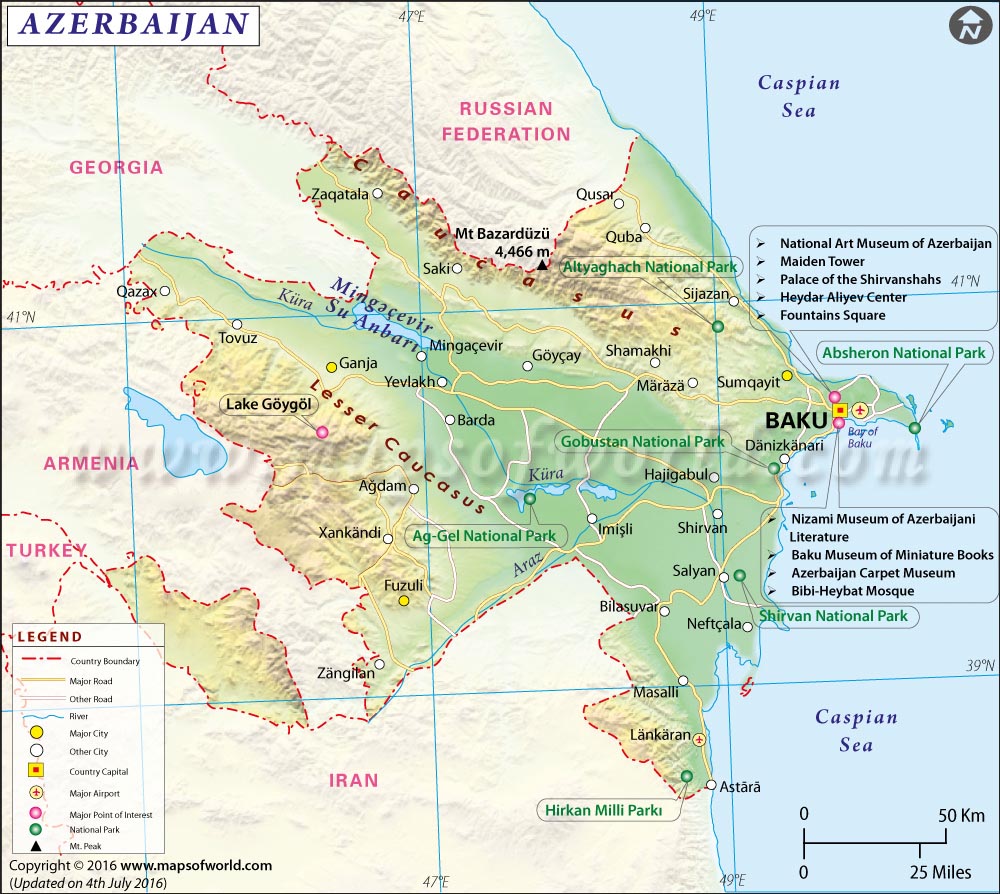History of Azerbaijan
Much of Azerbaijan’s history is characterized by a series of invasions due to its strategic location at the crossroads of Western Asia and Eastern Europe. Persia and Russia were the major empires to dominate the region.
By the the 6th century BC, the region was under control of the Persian Empire. In 4th century BC, it had emerged into the State of Aran, also known as Caucasian Albania. By 325 AD, Armenia had introduced Christianity, and for the next 300 or 400 years, the religion dominated the region and dozens of churches were built.
In 642, Muslim Arabs invaded many parts of the region, where they remained in power until the 11th century, when Turkish tribes from the Seljuk dynasty came. The Turkish language eventually overthrew the region’s Persian identity, which led to the creation of Azerbaijan’s distinct Azeri language.
In 1236, Mongolian warriors of the Genghis Khan Empire invaded, where their rule lasted until 1498.
In the 1500’s, the Safavid dynasty ruled Azerbaijan, followed by the Russian empire in 1722. The Russian occupation lasted until 1917, when rebellions for an independent state led to the end of their rule. When Russia became the Soviet Union, they invaded again in 1920, with their domination ending on August 30, 1991, with the declaration of Azerbaijan’s independence.
Geography
Azerbaijan is located in the south Caucasus region of Eurasia, situated on the Western part of Asia and the Eastern part of Europe. Its borders are the Caspian Sea to the east, Russia to the north, Georgia to the northwest, Armenia to the west, and Iran to the south.
The country has a vast variety of landscapes, including 800 km of coastline, with over half of its land defined by mountain ridges, crests, and plateaus, and the rest characterized by plains and lowlands.
Polities
Azerbaijan has a dominant party presidential republic. The President is Head of State and elected into position through direct elections, and serves a 5-year term. The President appoints his Cabinet, which consists of the Prime Minister, Deputies, and Ministers.
The Prime Minister is Head of Government and upon appointment by the President, is confirmed by the National Assembly of Azerbaijan. The National Assembly consists of 125 deputies and exercises Legislative power with the government.
Travel
Azerbaijan is a well known tourist destination that enjoyed its peak in the 80’s. Tension and clashes in the 90’s led to the tourism industry’s decline but growing interest in the region started to gain momentum in the early 2000’s. Azerbaijan has become famous for its religious sites, historical monuments, and resort spas.
The most popular and most visited destination in Azerbaijan is the capital of Baku – mixed with incredible historical and religious sites, as well as amazing feats of modern architecture. Baku’s Walled City became the country’s first site to be listed as a UNESCO World Heritage Site. Complete with over 50 monuments, the Walled City is home to the Palace of the Shirvanshahs, the Maiden Tower, the Synyg Gala, and plenty of well-preserved structures.
On the outskirts of Baku is the Gobustan Rock Art Cultural Landscape, filled with ancient rock carvings that are also listed as a UNESCO World Heritage Site. Around the carvings are inhabited caves, settlements, and burial sites that are said to be about 5000- 40,000 years old.
And for modern architecture, the Flame Towers in the city’s business district is one of the most unique building complexes in the world. Three skyscrapers that resemble 3 flames tower over the city and it’s famous for being fully covered in LED screens that reflect different images in motion.
For Azerbaijan’s famous spas, the Naftalan Oil Resort is famous around the world for offering healing spas that cover a wide range of health properties. Located 20km off the country’s 2nd biggest city of Ganja, tourists flock this town for the resort’s many health treatments.
And a town considered to be one of the oldest settlements in the Caucasus is Sheki – located along the Silk Road and known for being the city of craftsmen and tradesmen. It is home to the famous tekelduz chain-stitch embroidery, a handicraft that is distinctly Azerbaijan.
Education
Azerbaijan has an adult literacy rate of 97%, with its education system following those of the United States and Europe. Children begin schooling at the age of 6, and education is compulsory until the 8th grade. There is a total of 36 state-run universities and 15 private universities across the country, where English is the main language of instruction.
Trivia
- The most popular drink in Azerbaijan is tea.
- Azerbaijan is known as the Land of Fire due to the large deposits of oil that ignite on the earth’s surface from time to time all across the country.
- The first oil well was drilled near the capital of Baku in the mid 19th century.

